Our top pick
BEST OVERALL: Apple Watch Series 7
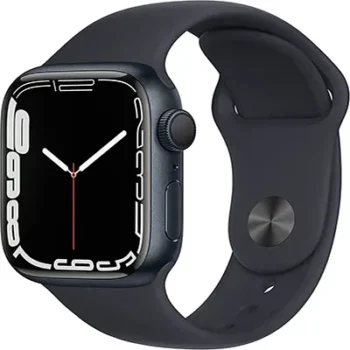
The built-in sleep tracker can help you monitor your sleep habits and see how you can make improvements. Additionally, the watch's GPS capabilities let you track your outdoor workouts, which can also help improve your sleep. With its crack-resistant front crystal and IP6X dust resistance, the Series 7 is also built to withstand the rigours of daily life.
The Series 7 also has a powerful sensor that can measure your blood oxygen level. This is really helpful if you have sleep apnea or other sleeping or breathing disturbances. And the ECG app can help you track your heart health.
Plus, the always-on Retina display makes it easy to stay on top of your sleep schedule and view your trends. So, whether you're a beginner or a seasoned pro at tracking your sleep, the Apple Watch Series 7 is the perfect device for you.
- :
Advantages
Disadvantages
BEST VALUE: Fitbit Sense Advanced Smartwatch
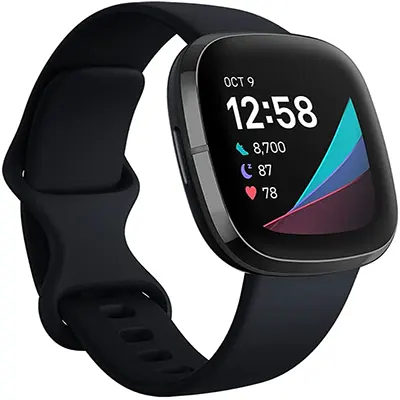
Fitbit Sense is a great smartwatch for those looking to track their sleep and not spend Apple-watch-kind-of money. The watch has several features that make it ideal for this purpose, including an EDA sensor, skin temperature sensor, and on-wrist ECG app. These features work together to help you track your body's response to stress and better manage it.
If you're looking for a smartwatch that can help you sleep better, the Fitbit Sense is a splendid option. Fitbit's sleep tracking app will allow you to track your sleep patterns, catch sleep disturbances and keep track of your overall sleep score. Additionally, the premium design of the watch makes it a great addition to your everyday wardrobe, so you can be certain you'll look fly even in your PJs.
Advantages
Disadvantages
BEST UNISEX: Fitbit Charge 5 Activity Tracker
If you're looking for a way to improve your sleep and not worry about your smartwatch looking too masculine or too feminine – Fitbit Charge 5 could be the perfect device for you. Regardless of the colour you choose – it'll blend perfectly.
On a more important note, the Sleep Score feature gives you a detailed breakdown of your sleep quality, including information on your sleep stages and how much time you spent in each stage. The Smart Wake feature uses this data to wake you up at the optimum time in your sleep cycle, so you feel more refreshed and energized in the morning. And if you need to take a break from notifications during bedtime, the “Do not disturb” mode will keep them at bay.
Advantages
Disadvantages
BEST DISCREET DESIGN: Fitbit Inspire 2 Fitness Tracker
If you're looking for a way to sleep better and look sleek, Fitbit Inspire 2 is the perfect way to do it! This health and fitness tracker not only tracks all-day activity like steps taken, distance travelled and calories burned, but it also monitors your heart rate 24/7.
Plus, it can track REM sleep, light sleep and deep sleep so you can get a better understanding of your sleep quality each night.
And if that's not enough, the Fitbit Sense is also swimproof (water-resistant to 50 meters) so you can wear it in the shower while you're unwinding before bed, without worrying about it dying on you.
Advantages
Disadvantages
BEST WATERPROOF: Xiaomi Mi Smart Band 6
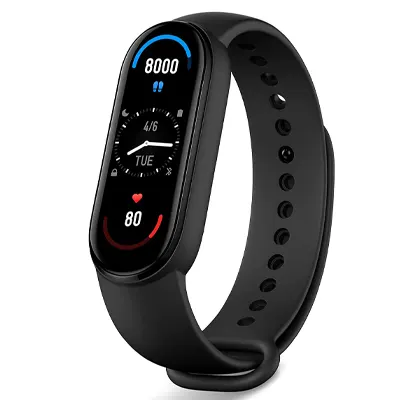
If you're looking for a way to get your sleep back on track but still maintain your aquaphile lifestyle, then Xiaomi Mi Smart Band 6 could be the answer you're looking for.
This smartwatch comes equipped with a SpO2 sensor and 24/7 heart rate monitoring, which means you can track sleep data more accurately than ever before.
In addition, the band also tracks 30 different activities, so you can see how your various daily activities are affecting your sleep duration and quality.
And if that's not enough, the band is also water-resistant up to 5 metres, so you can wear it while swimming, diving or showering without worry.
Advantages
Disadvantages
BEST CLASSIC DESIGN: Withings Steel HR Sport Smartwatch
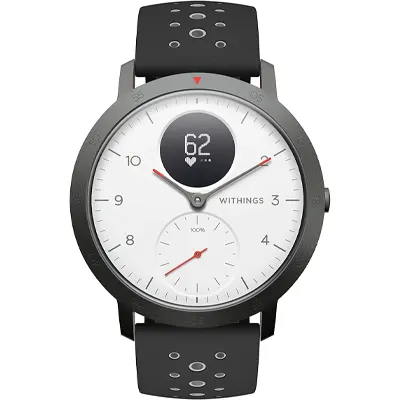
If you're looking for a sleep tracker that does it all and still looks dapper, Withings Steel HR Sport Smartwatch is a perfect choice.
This device monitors your heart rate both during the day and at night, tracks your daily activity, counts your steps, calories and distance walked, and even monitors both the deep and light sleep with the Withings sleep analyzer.
And thanks to its mighty battery that lasts up to 25 days on a single charge, you'll be able to wear it for virtually a month without worrying about running out of juice.
Finally, the smart notifications feature allows you to customize call, text, event & app notifications from your smartphone right on the watch screen and set it all up so you can fall asleep and stay asleep during the night.
Advantages
Disadvantages
BEST FOR WORKOUT & FITNESS: Honor Band 6 Smart Watch
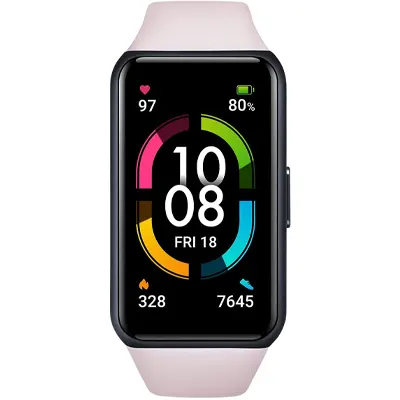
If you're a gym rat on the lookout for a sleep tracker that can do it all, HONOR Band 6 is the perfect option.
This smartwatch has a heart rate monitor and blood pressure monitor to keep track of your health, as well as a sleep quality analysis to help improve your slumber.
It also comes with a powerful fast charger and a long-lasting battery, so you can wear it for full two weeks without having to worry about losing power.
And with 10 stylish workout modes, you can track your gains and stay on top of your fitness regime while also allowing your body to properly rest after every gym session.
Advantages
Disadvantages
Before you buy a sleep tracker
Before you go out and spend your hard-earned money, there are a few things to keep in mind.
For starters, sleeping tracking is not the sole purpose you'd buy any of these devices for. Most of these devices also track your activity during the day, heart rate, and a whole host of other health metrics.
So, if you're just looking for a way to just improve your sleep quality, you might want to consider some other alternatives.
Additionally, keep in mind that most “sleep trackers” rely on an accelerometer to track your sleep. This means that they're only tracking your movement, not necessarily how well you're sleeping. So, if you're a light sleeper who moves around a lot during the night, the data might not be accurate.
Finally, while some of these devices come with apps that offer tips and tricks to help you get a better night's sleep, they're not miracle workers. If you're struggling with sleep, we recommend talking to a doctor first and foremost.
Features to look for in sleep tracker
As we've said, these devices aren't just a one-trick pony. Most of them monitor other aspects of your health as well, which can be more than useful. So, in order to get the most out of them – here are the features you should look for.
Wearable vs non-wearable
There are two types of sleep trackers – wearable and non-wearable.
Wearable devices are, as the name suggests, devices that you wear on your body while you sleep. These are usually in the form of a bracelet, watch, or a ring and they often come with additional features like the ability to track your steps and heart rate.
Non-wearable devices, on the other hand, are placed under your mattress or pillow and they only track your sleep. So, if you're not looking for anything else but a way to improve your sleep quality – we recommend going for a non-wearable device.
And, if you don't care for any of the two – you can get a smart mattress with the sleep tracking feature built right in. Although this one would be a bit more expensive than the others.
Overall design and comfort
Since we're focusing on wearable devices, the overall design and comfort are quite important. After all, you'll be wearing it on your wrist while you sleep, so it needs to be as cosy as possible.
Additionally, the device should be easy to use and the app should be user-friendly. If it's not – you're likely to just give up on it and never use it again.
It has to be well-made and properly optimized, with useful and easy-to-use features, accessible to those that may not know how to use a smartwatch.
And finally, the overall aesthetics and the design of the watch or a ring need to be good enough so that you'll actually want to wear it. No one wants to walk around with a monstrosity on its wrist.
Battery
Battery life is always an important aspect to consider, especially when it comes to wearable devices. After all, you don't want your sleep tracker to die in the middle of the night, now do you?
Most of these devices will need to be charged every 10 days or so, but some might need to be charged on a daily basis. It really depends on how often you use them and what features you have turned on.
For example, if you have the heart rate monitor turned on 24/7 – the battery will drain a lot faster than if you only had it turned on while you're working out. Also, if you have an Apple device, the battery will drain a lot faster, but more on that later.
Sleep tracking features
If you're in this to improve your sleep, this should be one of the most important aspects for you. After all, that's what these devices are made for.
Most of them will track your sleep cycles – light, deep, and REM sleep. But some might also track your heart rate, breathing, how often you toss and turn during the night or how often or loud you snore due to sleep apnea and your sleeping position.
Additionally, some devices will also offer additional features like sleep coaching and tips on how to improve your sleep quality. These can be more than useful, especially if you're struggling to get a good night's rest.
Overall, you'll want to look at the way they're analyzing this data and how you can use this data to sleep better and get more rest.
Heart rate & activity tracking
If you're frequently in the gym or just running and playing sports, you'll want to look for a device that can track your heart rate and activity. This way, you'll be able to see how your body is responding to different activities and workouts.
You'll be able to track your progress, your calories, and more. Now, keep in mind that some of these aren't that accurate, so if you want the accurate reads and pinpoint precise data – you'll want to steer clear of cheap, knock-off devices.
Display
Some might argue that the screens on these things don't matter, but we'd say quite the opposite.
Not only do bigger, brighter and better screens lead to a better user experience (especially if you're using the tracker outside), but they also affect performance and battery life.
For example, features like an always-on display will drain the battery but will have all your data easily accessible and seen at all times. On the other hand, monochromatic or low-res screens will probably look a bit underwhelming but the battery life will be through the roof.
Tips for buying and using sleep tracker UK
Before we get any further, we thought we'd share a few tips with you on how to buy and use a sleep tracker.
- Make sure the device is compatible with your smartphone – Most sleep trackers will need to be connected to your smartphone in order to work properly. So, before you buy one, make sure that it's compatible with your phone.
- Check the reviews before you buy – Always check the reviews before you buy any type of wearable device. This way, you'll be able to see what other people are saying about it and if there are any major issues that you should be aware of.
- Choose a comfortable device – Since you'll be wearing the device while you sleep, it's important to choose one that's comfortable and won't bother you during the night.
- Don't overspend – There's no need to break the bank in order to get a good sleep tracker. There are plenty of great options that are quite affordable.
- Review the data that is being tracked – There's no point in tracking your sleep if you're not going to review the data and see how you can improve your sleep quality.
- Set goals and create a sleep routine – In order to get the most out of your sleep tracker, you should set goals and create a sleep routine. This way, you'll be able to track your progress and see how well you're doing.
- Consider a device with heart rate and activity tracking – If you frequently work out or play sports, you might want to consider a device that can track your fitness efforts.
We could probably go on for days, but we feel like these seven sum things up pretty clearly, don't they?
The advantages of owning sleep tracker UK
What good is a sleep tracker if it isn't offering any advantages, right? Well, below are three of the main advantages that you'll get with a sleep tracker.
- Helps to improve sleep quality – One of the main advantages of using a sleep tracker is that it can help you to improve your sleep quality. It does this by tracking your sleep patterns and giving you insights into how you can improve your habits. Some may even offer advice.
- Does a lot more than just track sleep – While the primary purpose of a sleep tracker is to track your sleep, most of them can do a lot more than that. For example, many of them will also track your fitness and activity levels and allow you to answer and make calls, check notifications, send messages, pay for stuff, and so on.
- Stylish and comfortable – Another advantage of sleep trackers in form of smartwatches is that they usually look quite good and are very comfortable to wear, even during sleep.
- Makes your day-to-day life much easier – With so many features on your wrist, you won't need to fumble around for your phone as much anymore, making your day-to-day life so much easier.
In the end, what's important is that you find a sleep tracker that suits your needs and budget. There are plenty of great options out there, so take your time and find the perfect one for you.
Spread the word
FAQs about your sleep tracker UK
Before we let you go, allow us to answer some commonly asked questions and sleep trackers.
You should watch your sleep tracker all the time. Most of them are made to withstand the rigours of everyday use, so by all means – wear them.
It should be able to, but if you have trouble sleeping, it's best you talk to a professional rather than take advice from a smartwatch.
Unless you're an Apple enthusiast, you'll get at least 10 days of battery life on average from any reasonable sleep tracker.
Most sleep trackers (at least wearable ones) come with GPS capabilities.
Yes. Any reputable sleep tracker should notice when you fall asleep.
es. Most of them are water-resistant up to 50 metres, so you don't have to worry about water, sweat, or any other liquid you'd usually interact with.













There are no comments yet
"*" indicates required fields